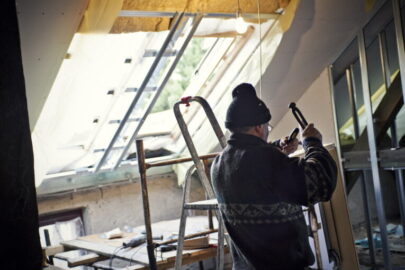Increasing numbers of homeowners are choosing to improve not move, as the costs of moving often outweigh the benefits of adding size and value to their existing homes, according to research from Nationwide Mortgages.
However, there is a clear north-south divide when it comes to reaping the benefits of home improvements,
Nationwide said that, with the average gap between house moves for owner-occupiers with a mortgage standing at 10 years, homeowners are putting funds directly into their current home and staying put in the neighbourhoods they know and like, making structural improvements to add space and value. However, those living in areas where house prices are lower may find that their properties may not see the gains in overall value as those areas where prices are higher and rising – or may not fully recoup their investment when it comes to selling up.
As there is a relative gulf between house prices across different regions, according to the Nationwide Mortgages data, it means that home owners in the North of England, Scotland, Northern Ireland and Wales are spending a much larger proportion of their home’s value to achieve the same results than those in London, the outer London Metropolitan area and the wider South East.
While Londoners may take out a further advance on their mortgage of just under £50,000, with the current average London house price currently at £456,000 this represents only 10.7% of the value. By contrast, home owners in the North may have an average further mortgage advance of £22,600, but with the average house price of £123,900 this represents a much larger slice of the value at 18.3%. This extra relative cost was closely followed for those in Scotland (18.2%) and Northern Ireland (17.6%).
According to the research, 31% of those surveyed considered the kitchen as the room where money was best spent, followed by the living room (22%). By contrast, only 11% thought investing in a new bathroom added value, while 7% said that a bedroom was worthwhile. Six in 10 said they would prefer to stay put and either extend, make cosmetic changes or put up with their home as it is, as against a quarter (27%) who indicated they would prefer to move to a larger property.
In fact, Nationwide’s house price data highlights that home improvements such as extensions, bedrooms and bathrooms add significant value to a property, with an extension or loft conversion increasing the value of the average home by £42,700, a new bedroom adding £22,100 and an extra bathroom £9,600. As a rule of thumb, every ten% increase in floor area adds £10,000, or five%, to the average property value.
The statistics revealed there are three main peaks for spending on DIY and home improvements each year, both large-scale and smaller spending, but they don’t necessarily coincide.
The largest spike for both DIY credit card and personal loan spend and larger mortgage further advances is around the Easter break. This coincides with holidays from work and school, improving weather and a number of bank holidays, and DIY spending on credit cards and personal loans as well as further mortgage advances for structural improvements all spike at this time.
However, credit card spending tends to spike again in July and August, when many are taking their main holidays, and again in the run up to Christmas, as families do up their homes in preparation for relatives Further mortgage advances also tend to have a minor peak in July, but the other main spike for applications for advances for structural work is in January.
In 2015, Nationwide credit card customers spent more than £627 million pounds on home improvements – 22% more than they did in 2013. The number of DIY projects undertaken by Nationwide customers has gone up from 5.2m in 2013 to 6.5m in 2015, an increase of a quarter.
When it comes to the average age of those customers taking a further advance for structural improvements, it has fallen steadily from 44 years old in 2013 to 41 now – an age that may well reflect the point at which many have expanding families and growing children requiring the extra space.
And while homeowners with mortgages may stay put in the same house for a decade, those in private rental remain in the same home for around three and a half years. Those who own their home outright enjoy them for almost a quarter of a century (24 years).
Andrew Baddeley-Chappell, Nationwide’s head of policy for mortgages and savings, said: “Improving rather than moving for many may be the most effective way for people to cater for their changing needs at different stages of their lives. Instead of spending money on finding more space elsewhere, they can extend their existing mortgage borrowing in a cost-effective way to remain in the area they know and like.”
